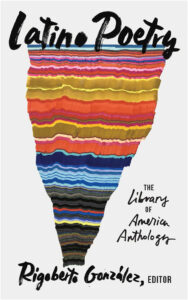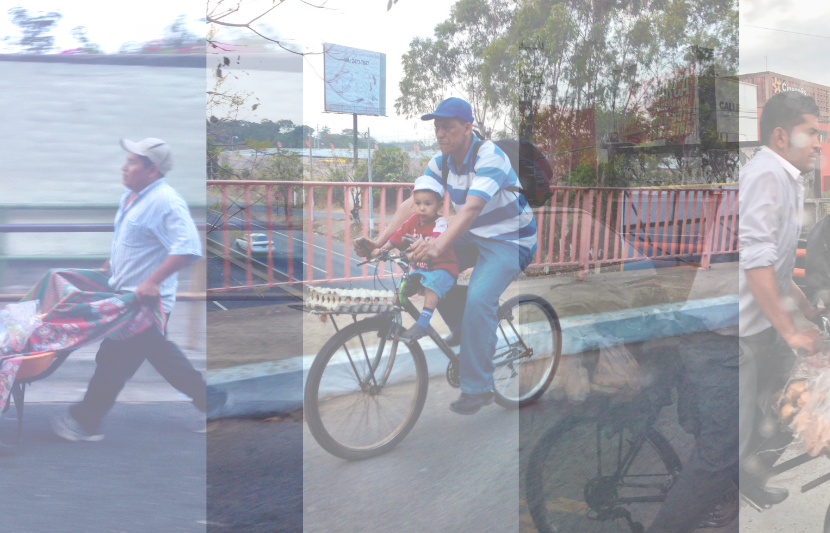
Photos from Through the Bulletproof Glass by Alexandra Lytton Regalado
“In layers of memory, we are apart and together,” writes the Salvadoran American poet Alexandra Lytton Regalado, reflecting on the themes of trauma, exile, and longing for return expressed by the seven poets with ties to El Salvador included in Latino Poetry: The Library of America Anthology.
Their poems, Regalado writes in the essay below, are marked by the long shadow of the Salvadoran Civil War (1979–92), a conflict between El Salvador’s government and the guerrilla forces of the Farabundo Martí National Liberation Front (FMLN), during which at least 75,000 people were killed or forcibly disappeared. The many war crimes against civilians were overwhelmingly committed by the Salvadoran Armed Forces, recipient of massive infusions of American arms and funding. A notorious example of the army’s scorched-earth strategy was the El Mozote Massacre. On December 11–12, 1981, the U.S.–trained Atlácatl Battalion murdered, tortured, and raped nearly 1,000 civilians, half of whom were children.
Regalado notes that after the conflict’s formal end in 1992, many Salvadorans continued to flee the country due to gang violence, government corruption, and social inequality. As the poet Javier Zamora observes in “El Salvador”: “the war has never stopped.”
The ongoing nature of the conflict reverberates in the current administration’s antagonism toward official memorial efforts; ProPublica has reported on attempts to thwart the persecution of war criminals, including military officers involved in El Mozote. The administration has also faced criticism for its “state of exception” government that, although successful in reducing homicide rates, has not shied away from arbitrary detentions and mass jailings.
Regalado’s essay is accompanied by photographs from her ongoing project Through the Bulletproof Glass.
By Alexandra Lytton Regalado
Poems can be time portals. Think of a clock, and imagine a third hand, not the second hand but the hand of trauma, jostling the hour and minute hands backwards and forwards. The seven Salvadoran poets included in Latino Poetry: The Library of America Anthology reference the sticky and slippery quality of time as they explore themes of memory, war, exile, family, and identity. All the Salvadoran poems included in the anthology, including my “La Mesa,” were originally published after the 1992 signing of the peace treaty that brought a close to El Salvador’s twelve-year civil war, and although the word “war” does not always appear, each of these poems speak of leaving and returning.
Even now, our stories remain rooted in war because, for most of our generation, the civil war is bound up with our origin stories—why our parents left and why many of us grew up in the United States. As poet William Archila said to me, “To be an exile is like becoming a ghost to oneself and to those one left behind. To be an exiled writer is to never be free from the past. It is to communicate in a language of neither here nor there.” Because our sense of time has been fractured, these anthologized poems address the difficulty of staying in the moment and the accompanying loop of anxiety and nostalgia that results from wanting to be in two places at once.
In layers of memory, we are apart and together; we travel on a never-ending Möbius strip of now and then, collapse and creation just a breath apart. As poets, we enter portals of time through myth, music, and symbols. How then, do we register the feeling of arrival? Of being in the now? The ability to stay in the moment implies a sense of stability that many from our generation of Salvadorans have yet to experience. We are known for being adaptable and resilient, self-described survivors. Yet when we are focused on survival, we are constantly fighting, fleeing, or feigning, and it can be difficult to tap into the present, to go beyond a foreshortened concept of the future, to construct a clear historical perspective of the past, and therefore to heal and grow. Pain, central to many of the poems, becomes an unlikely doorway to the present. When we feel the flare of pain, all our senses tune into the immediate moment and the breath—in the midst of a song, a poem, or a good cry, we find ourselves tied to the now.
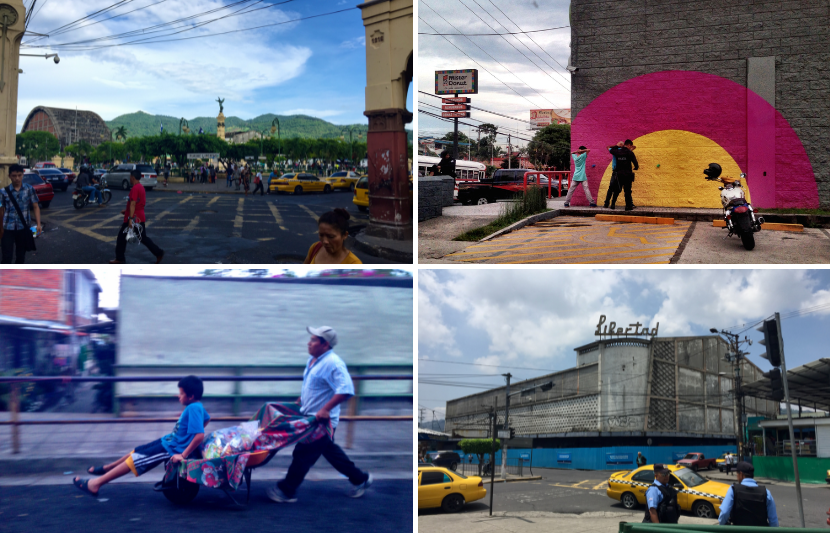
In “Ars Poetica,” Claribel Alegría declares herself a “poet by trade,” ushering in the Salvadoran selection with a symbolic passing of a torch. She identifies herself as a crow (an image consistent throughout her body of work), a scrappy, problem-solving animal, and insists that she “would never trade places” with a static art object like the Venus de Milo that can be collected and gawked at in a museum. “I discover the sun,” she writes, opting for a verb that tethers her poem to a generative present, as she describes the confluence of images that surprise her daily: the sun, valleys, volcanoes, as well as the “debris of war,” which also become part of the landscape. In the seamless inclusion of violence and destruction into the description of her surroundings, she seems to echo our Salvadoran acceptance of pain as part of the everyday. The sights she lists amount to “the promised land,” acknowledging its imperfection and the inextricability of beauty and suffering. In this, the poem offers a frame to read the rest of the poems in the Salvadoran folio, because as a fellow poet “by trade,” her crow-like survival instinct is also part of the Salvadoran literary DNA.
Indeed, as children of immigrants, we subsume our anxieties around loss, homesickness, and alienation into a generalized fear of the unknown.
In “Letter to an Exile,” Alegría inhabits the voice of Penelope addressing Odysseus in The Odyssey, describing the weight of his absence on her and her son. She summarizes the familiar story, of Odysseus’s long journey and Penelope’s wait, a tale that, with its notions of stranger (xenos) and host (xenodokos), can easily be read in parallel to the story of all immigrants. The act of weaving and unweaving “an interminable cloth” during this long wait feels particularly resonant here, perhaps illustrating the sense that, in telling a story, our memory of the events it describes can shift.
Alegría affirms her feminist stance as she questions men’s pride in the second part of the poem, telling Odysseus in her letter “don’t return / men are weaker / they cannot tolerate affronts,” and closing by saying that her love has gone to ash and her son is better off thinking his father has died. She brings up Odysseus’s affairs with Calypso and Circe and instructs him to settle down with one of them. She warns him not to go off to war yet again, pointing to “Menelaus and his / Helen,” but behind this voice is also Alegría’s, referring to “that mad war / [where] our best men / have lost their lives.” Indeed, Alegría’s poetry is often intertextual and grounded in history. In her acceptance speech for the Queen Sofía Prize for Ibero-American Poetry in 2017, she explained:
I identify with Penelope, Artemisia, La Malinche; I even identify with Medea. Greek myths have had the most influence on me . . . My poetry then was lyrical. It never occurred to me at that time to write poems that reflected the misery of my two homelands. I thought Central American dictators were inevitable, so beyond remedy, like the earthquakes and storms that battered my region. But I changed over time and began to write poems that reflect the suffering, the injustices and the cruelties. More than political poems, I call them love poems.
Alegría transfers the Salvadoran reality of families exploded by war and immigration into the realm of myth to allow a broader audience to make parallels, but perhaps also to understand these histories as strands of a larger tapestry of human experience.
In William Archila’s “Duke Ellington, Santa Ana, El Salvador, 1974,” music, like myth, emerges as a medium that connects distinct histories to other places, times, and cultures. Archila explained to me that this poem was inspired by his love for jazz and his search for a father figure. In 2016, while teaching Central American immigrants (most of whom had arrived in the United States as unaccompanied minors), he discovered that:
[T]heir stories always lead back to poverty, gang violence and the lack of economic opportunities, but most importantly the psychological and emotional pain that comes with the lack of a father’s presence in the family. Their stories led me back to my immigrant story and my father’s absence in those early years. I was fatherless and so were they.
Archila explained that his poet mentors Yusef Komunyakaa and Philip Levine introduced him to the range, depth, and subtlety of Ellington’s craft, and also noted how this aesthetic influenced the spontaneity of his writing process, one that involves no “elaborate plans or preparation, [I] just pour it out as it comes, and then maybe [do] some cold editing here and there,” in an attempt to write poetry the way jazz music is created—arising from the impulses of the present moment.
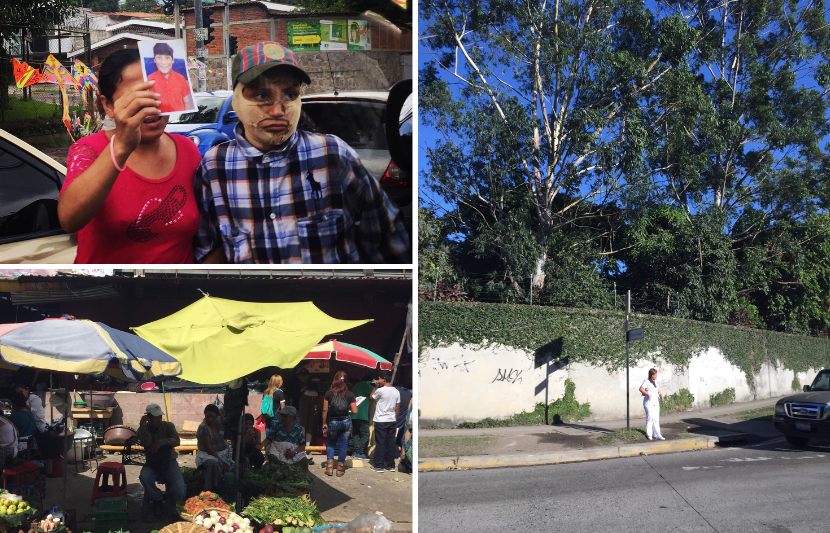
Archila’s Ellington is imagined in a Salvadoran school, where the musician might have worked as a teacher, with the intention of placing “one of my heroes in another dimension or physical space.” He envisions Ellington drawing the children out of their torpor: “He will swing the piano keys, a syncopated phrase / and we will listen: no need to study war no more.” For Archila, the act of imagination plays a role in healing:
I want my countrymen and women to experience the joy and transcendence I have experienced listening to Duke Ellington’s music. I want them to put down their dirty wars and contemplate their imagination. I want them to put down their weapons and like brothers and sisters listen to such beauty.
Archila sees this poem as a way of reconnecting with a “homeland of the imagination.” It is especially moving to note how he closes the poem, addressing his country with the possessive pronoun “my.” In this way, he emphasizes a sense of belonging and establishes his relationship to El Salvador across time and distance.
In her poem “Parallel Universe,” Cynthia Guardado also seeks access to that portal that extends “across the wreckage of time,” a passageway where memory goes beyond the binaries of here and there, light and dark, “the Morse code between / spaces.” A nine-year-old child is in her parents’ house in Inglewood, California, remembering her grandmother’s home in Buena Vista, San Rafael, Chalatenango. She finds her “world has split in two” and struggles to figure out how to translate the passage of time, as all her previous visits to El Salvador seemed to have amalgamated into one monumental visit. The speaker walks in her mother’s and her grandmother’s houses (connected by a “portal”) and describes her many fears: of the darkness, a coming storm, and the disappearance of her loved ones into “the portal’s open mouth.” Indeed, as children of immigrants, we subsume our anxieties around loss, homesickness, and alienation into a generalized fear of the unknown. As Guardado told me in an interview, “a kid doesn’t understand colonization, borders, or classism. They recognize the difference [between how we’re treated in one place versus another] but not why.” Only as an adult can Guardado understand the source of the child-speaker’s anxiety at the core of her poem.
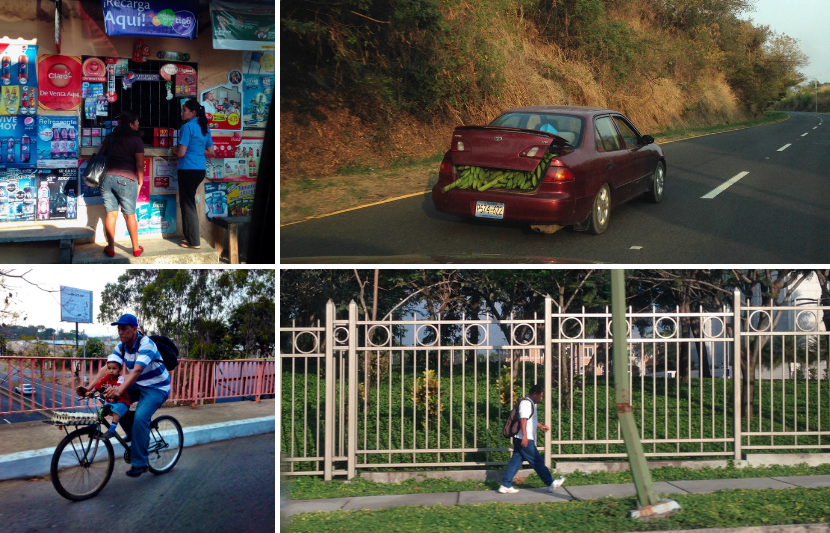
Surviving in the in-between takes its toll, Guardado notes, and results not only in pain but in a sense of guilt “which the second generation normalizes. And it’s hard to see that that pain is not normal.” In this poem Guardado deftly reveals how difficult it is for Salvadoran immigrants to stay in the moment through the young speaker’s longing to be in both places at once. She remarks, “As immigrants our existence is coated with a layer of grief always . . . we can never be in one place permanently. Pain is felt across the distance.” And with this constant shuffling, transitions are often the most difficult part. In the poem’s closing, the family dog becomes a quasi-mythical being who, in the speaker’s memory, “chased us / through the clouds. He ran faster and faster like he knew / we weren’t coming back.” As the dog anticipates their departure, the speaker longs for the dog to catch up and sink his teeth into her with “a plea for us to listen, to stay a little while longer.” This ending also echoes Archila’s last lines, as both poems ask that we listen and linger in the present moment.
In Leticia Hernández-Linares’s poem “Translating the Wash,” the passing of time is represented as “the folding of days.” Having developed over fifteen years a closeness with a laundress, an immigrant from Vietnam, the speaker notes how this woman has “sewn my ripped fabric / together, erased my stains, polished delicates.” The woman gives motherly advice when the speaker brings her newborn to meet her, provides “jagged-edged warnings” about strife between siblings, noting a story about a little girl who was jealous of the family’s new baby and threw herself out a window. After hearing this anecdote, the speaker says, “I pack her story in my bag, wait and wish / for shock, dismay, but they don’t come. Some things are not lost in translation.” The speaker wonders when the laundress will find “bread and breath” in the constant fight of the day-to-day, a question that echoes her own sense of “arrival”—or lack thereof—as an immigrant woman.
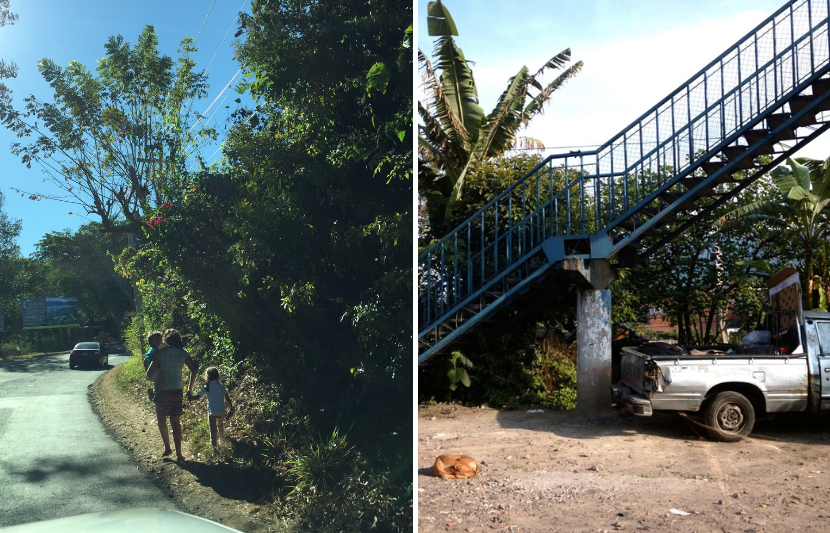
Hernández-Linares told me she wrote this poem when she was living in San Francisco’s Mission District. For fifteen years she brought her laundry to the same woman and was reminded of La Siguanaba, a figure of folklore who washes her clothes by the river. The act of tending to clothing also recalled Hernández-Linares’s memories of her grandmother, an expert seamstress and embroiderer. In the poet’s search for community and familiarity in a new country, it is as if these three women—La Siguanaba, the grandmother, and the laundress—coalesce into a single being of myth and memory. And yet, reflecting in our conversation on nostalgic evocations of pasts familial and mythical, Leticia remarked, “It’s good to want to return to the past to understand, but we also need to look forward and think about what we’re teaching and learning now”—a reference to the current government’s censorship, mass jailings, and elimination of sexual education.
My own poem “La Mesa” is a response to El Salvador’s political situation in the early 2010s in conversation with Carolyn Forché’s 1981 poem “The Colonel. Although the poems are thirty years apart, similar themes emerge, as if through a glitch in time, illuminating how corruption is deeply rooted and continues to flourish in El Salvador. The civil war’s past parallels the present as similar atrocities are committed in a perpetual cycle of poverty, hyper-surveillance, and violence.
An updated version of “La Mesa” could be rewritten each decade and would reflect a strikingly constant condition against the backdrop of a new period. Similar themes would continue to echo around dinner tables and in dining rooms, where the only marker of the passage of time would be newer decor. Currently, under the current administration in El Salvador, freedom of speech is still endangered. This enforced silence, symbolized as severed ears in “The Colonel,” resonates in the child’s unanswered questions in “La Mesa” in regard to a houseless person seen from a car amid flashing imagery of lavish excess, corruption, fear, and violence: “waiters dressed in white tuxedo jackets, the black moth of death clinging to their throats as they listen, offering a second helping of roast lamb.” “What does she want? Where is her car? Where is her house?” the child asks. “What to answer?” both poems seem to ask in turn. But there are no clear answers, and those who are quick with a reply would like to serve “the country carved up like a pie.” The speaker addresses the way these deeply unequal and distressing situations persist, as if by sleight of hand: “a dish broke—the action disembodied of any blame or fault—an object disappeared of its own volition.” The imposed or voluntary silence of the speaker and of those sitting at past and future dinner tables hisses on a loop.
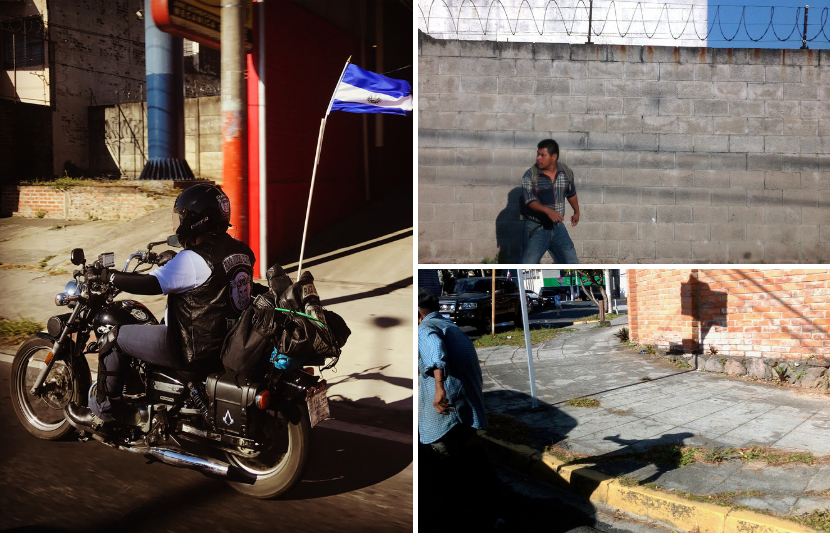
Christopher Soto’s “The Joshua Tree // Submits Her Name Change” offers an examination of how these political circumstances shape the contemporary realities of migration. Speaking in the collective “we” of those crossing, the poem addresses the allegorical image of the Joshua Tree—a woman that grows out of root and branch cuttings, a survivor and witness who, over the course of the poem, becomes one with the migrants, incarcerated in a detention center and suffering alongside them. Here, Soto describes the macabre genesis of the detention center, built out of the bones of the migrants it imprisons: “Our clavicle The second // Her spine,” their identities meshing as “She coughed & combed the floor // Our chest shiv Shivering.” Soto’s severed lines also evoke a sense of constriction and amputation. The detention center is not only the physical jail but a metaphorical prison that encompasses the broader working conditions of the undocumented, the “cracked tiles // dirty dishes” that stretch beyond the border and wreak havoc on the migrants’ physical and mental health.
In an interview, Soto told me he wrote this poem while working for an anti-carceral organization, which led him to consider the intersection of the U.S. prison system and migrant detention centers. “The diaspora is definitely living in a constant state of belonging and disbelonging,” he said. Invoking the ideas of the Martinican writer Éduard Glissant, he added, “the border is something to be respected, a shift in climate or space. . . . The border does not need to be a site of punitivity, extraction. Maybe my final line is an echo toward that—acknowledging all the borders around us (interpersonal boundaries, languages, etc.). I feel like I have reverence now for borders but not how they are treated by the nation-state.”
The closing of the poem is acute in this awareness in the same way our bodies pull us into ourselves when in pain:
This border // Isn’t a stitch // Where nations meet
This border’s a wound // Where nations
part
If Alegría opens the folio of Salvadoran poets in Latino Poetry, inhabiting the voice of Penelope telling Odysseus not to return, Javier Zamora’s poem “El Salvador” seems to respond with its returning speaker, wearing a “beard of salt,” wanting to touch the “volcanic face” of his homeland like a long-lost lover. Worried about being confused with a “gangster,” he pleads to his homeland to welcome him back and laments how El Salvador has been picked at by the gangs’ “metallic beaks, / and presidents, guilty.” His parents urge him not to return, decrying the lawless state of the country and warning him that his tattoos could lead him to be misidentified as someone involved with organized crime. Even his family in El Salvador insist that there’s nothing left for him to discover there but “black bags” (referring to corpses found stuffed within them) and “empty homes.” His homeland’s very name is double-edged—Salvador, Jesus the savior—and the speaker pleads with both, asking to make it “easier to love you . . . Make it easier / to never have to risk our lives.”
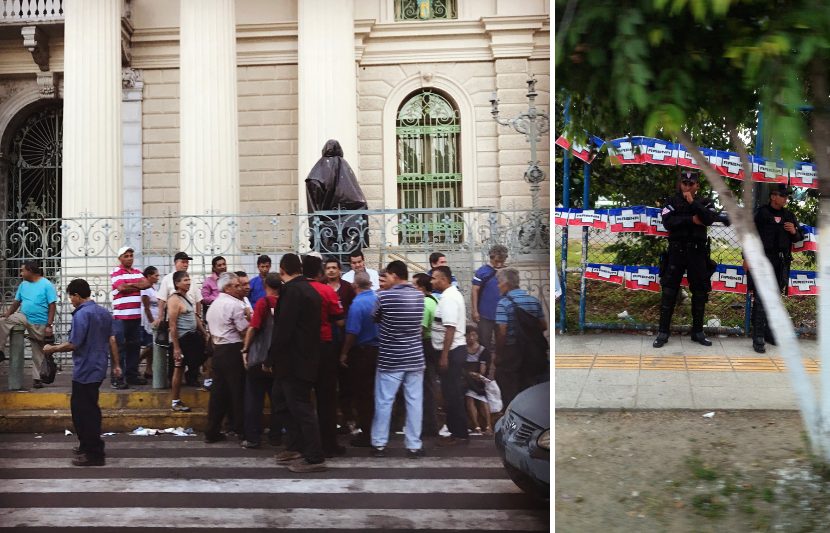
Indeed, for exiles, negotiating our feelings upon returning to a homeland with our memories, expectations, and what we see on the news is something akin to being drawn and quartered. Zamora told me:
Returning is a complicated thing for us immigrants. It’s something I longed for when I couldn’t, and when I finally could (before writing this poem), I think I knew it wouldn’t be like how I imagined . . . This circularity, of leaving, of coming back, to me, weirdly parallels Latin American history. Specifically for my country, it seems like we’re circling back to a prior era—politically speaking. The present moment is constantly kicked forward as we try to grasp the past and foresee the future.
The final poem of the Salvadoran folio is a swinging door, and it doesn’t give any answers or provide any signposts; rather, it completes a lap within a continuous labyrinth, the clock resets with every orbit, the past and future flicker and flare in parallel worlds; and the present, like a wound, mumbles its bright blood. All the while, we continue, spurred by terquedad and resilience, hoping to someday arrive.

Alexandra Lytton Regalado is a Salvadoran-American author, editor, and translator. She is the author of Relinquenda, winner of the National Poetry Series (Beacon Press, 2022); the chapbook Piedra (La Chifurnia, 2022); and the poetry collection Matria, winner of the St. Lawrence Book Award (Black Lawrence Press, 2017). A CantoMundo and Letras Latinas fellow, her work has appeared in Poetry, Best American Poetry, BOMB, World Literature Today, Agni, poets.org, and Creative Nonfiction. Her translations of contemporary Salvadoran poetry are published or forthcoming in New England Review, Poetry International, FENCE, and Tupelo Quarterly. She has translated poetry collections by Elena Salamanca, Tania Pleitez, Lauri García Dueñas, Dorelia Barahona, and co-translated Efímero by heidi restrepo rhodes. She also serves as the official translator for the Alta California Chapbook Prize, now in its third year. Alexandra is co-founder of Kalina Press in El Salvador (est. 2006) and has edited more than twenty works, including the bilingual anthologies of Salvadoran literature Theatre Under My Skin (Poetry, 2014) and Vanishing Points (Prose, 2017). She is president of the board of the Salvadoran Cultural Institute and assistant editor at SWWIM (Supporting Women Writers in Miami).
